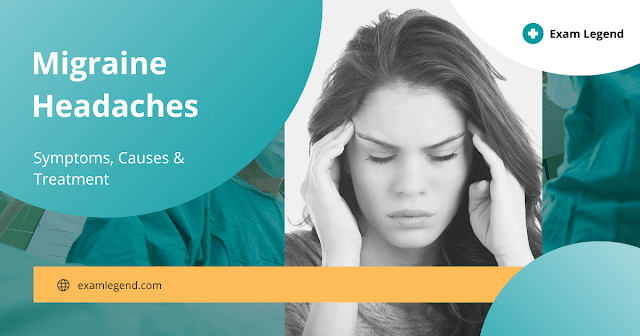Migraine Headaches: Symptoms, Causes, and Treatment
Migraine headaches are a neurological disorder that affects more than 39 million people in the United States alone. Migraines are more than just a headache and can cause severe pain, visual disturbances, and sensitivity to light and sound. In this article, we will discuss the symptoms, causes, and treatment options for migraine headaches.
Symptoms of Migraine Headaches
Migraine headaches can cause a wide range of symptoms, including:
- Intense throbbing or pulsing pain on one or both sides of the head
- Nausea and vomiting
- Sensitivity to light and sound
- Blurred vision or seeing spots
- Tingling or numbness in the face or extremities
- Fatigue or weakness
- Difficulty speaking
Migraine headaches can last for hours or even days and can be disabling for some people. The symptoms of a migraine headache can vary from person to person and can even vary in the same person from one attack to the next.
Causes of Migraine Headaches
The exact cause of migraine headaches is still unknown, but researchers believe that a combination of genetic and environmental factors play a role. Some of the factors that can trigger a migraine attack include:
- Hormonal changes in women, such as during menstruation or menopause
- Certain foods or drinks, such as alcohol, caffeine, and aged cheeses
- Stress, anxiety, or other emotional triggers
- Changes in sleep patterns
- Bright or flashing lights, loud noises, or strong smells
- Changes in the weather
Treatment of Migraine Headaches
There is no cure for migraine headaches, but there are several treatment options that can help to manage the symptoms and reduce the frequency and severity of attacks. Some of the most effective treatments for migraine headaches include:
Over-the-counter medications:
Nonsteroidal anti-inflammatory drugs (NSAIDs) such as ibuprofen or aspirin can help to reduce the pain and inflammation associated with migraine headaches.
Prescription medications:
Triptans such as sumatriptan and rizatriptan can help to block the pain signals in the brain that cause migraine headaches. Other medications such as beta-blockers, anticonvulsants, and antidepressants may also be used to prevent migraine attacks.
Lifestyle changes:
Making changes to your diet, sleep habits, and stress levels can help to reduce the frequency and severity of migraine headaches. Regular exercise, relaxation techniques, and avoiding triggers can also be helpful.
Alternative therapies:
Acupuncture, biofeedback, and massage therapy may also be helpful in reducing the symptoms of migraine headaches.
Conclusion
Migraine headaches can be a debilitating condition that can greatly impact a person's quality of life. If you are experiencing the symptoms of a migraine headache, it is important to seek medical attention to determine the best course of treatment. By working with your healthcare provider, you can find a treatment plan that works for you and helps to manage the symptoms of this chronic condition. Remember to take care of yourself and avoid triggers that can lead to migraine attacks. With the right treatment and lifestyle changes, you can live a full and healthy life despite having migraine headaches.

Comments
Post a Comment